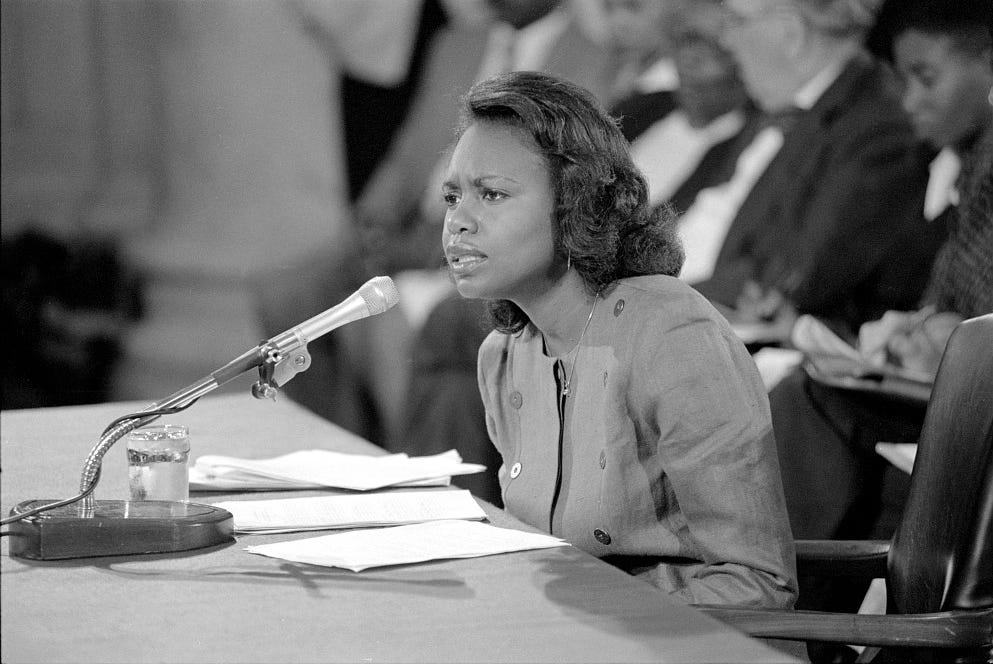This Day in Legal History: Anita Hill
On October 6, 1991, Anita Hill, a law professor at the University of Oklahoma, accused Supreme Court nominee Clarence Thomas of sexual harassment, dramatically shifting the course of his confirmation process. Hill, who had previously worked under Thomas at the Department of Education and the Equal Employment Opportunity Commission, alleged that Thomas made repeated sexually inappropriate comments during their professional relationship. Her allegations were leaked to the press after the Senate Judiciary Committee had already voted to send Thomas’s nomination to the full Senate. In response, the Committee reopened the hearings, and Hill testified publicly on October 11, describing in detail the behavior she claimed to have experienced. Her testimony was televised nationally, drawing intense media coverage and sparking widespread public debate about sexual harassment, gender dynamics, and power in the workplace.
The hearings were often contentious, with Hill subjected to sharp questioning from senators, many of whom expressed skepticism about her motives. Thomas categorically denied the allegations, famously calling the proceedings a “high-tech lynching” during his own testimony. Despite the controversy, the Senate narrowly confirmed Thomas to the Supreme Court by a 52-48 vote on October 15, one of the closest margins in modern confirmation history. Hill’s testimony, however, had a lasting impact beyond the nomination itself.
The episode galvanized public awareness of workplace sexual harassment and is often credited with sparking a surge in women seeking elected office in 1992, dubbed the “Year of the Woman.” It also led to changes in how such allegations were addressed in professional and legal contexts. The legacy of the hearings continues to influence discussions of gender and accountability in government and law.
The U.S. Supreme Court begins its new term today with a docket that includes significant cases related to President Donald Trump’s exercise of executive power. Key cases center on Trump’s efforts to impose tariffs and remove certain federal officials—moves that could test the constitutional boundaries between presidential authority and congressional control. The Court has already sided with Trump in several emergency rulings this year, including a June decision that curtailed judges’ ability to block presidential policies nationwide.
In addition to executive power disputes, the justices will take up cases touching on contentious social issues, including the legality of a Colorado law banning “conversion therapy” for minors, rights of transgender student athletes, gun control, and race-related policies. The Court’s conservative 6-3 majority, including three Trump appointees, is expected to play a crucial role in shaping these outcomes.
Other notable cases this term involve a Texas murder conviction potentially violating the defendant’s Sixth Amendment right to counsel, and a malpractice suit that questions whether federal courts must apply state laws requiring expert affidavits in medical negligence claims. The justices will also consider a campaign finance case involving Vice President JD Vance and a law allowing lawsuits over property seized by the Cuban government.
US Supreme Court opens new term, with major Trump cases in store | Reuters
A federal judge in Oregon, Karin Immergut, has temporarily blocked President Donald Trump’s administration from deploying any National Guard troops—whether from Oregon or other states—to Portland. The order, issued on Sunday, follows an earlier ruling by the same judge that stopped Trump from sending 200 Oregon National Guard troops. In response, the administration tried to redirect troops from California and Texas, arguing that their prior federalization allowed for deployment anywhere. Judge Immergut rejected that argument, stating there was no justification for military presence given the current protest activity in Portland.
Oregon officials accused the administration of legal “gamesmanship,” calling the attempt to bypass the initial order an affront to the court’s intent. The ruling will remain in place until at least October 19 while broader legal challenges play out. The Pentagon had planned to send troops to support federal agencies like ICE and protect federal property. Defense Secretary Pete Hegseth had also called up Texas troops for deployment in multiple cities, including Chicago and Portland.
National Guard units are generally controlled by state governors unless federalized, a point central to Oregon’s legal argument that Trump was overreaching by seizing control of state resources. Governor Gavin Newsom of California called the deployment an abuse of power, echoing broader concerns about the erosion of state sovereignty. Judge Immergut emphasized that presidential military authority, while broad, is not unlimited and cannot override facts on the ground or constitutional limits.
US judge blocks Trump from sending any National Guard troops to Portland for now | Reuters
A coalition of unions, employers, and religious groups has filed a federal lawsuit in San Francisco challenging a recent proclamation by President Donald Trump that imposes a $100,000 fee on new H-1B visa applications. The plaintiffs, including the United Auto Workers, the American Association of University Professors, and others, argue that Trump exceeded his legal authority by unilaterally altering a visa program created and regulated by Congress. They claim the president cannot impose such a fee without congressional approval, calling the move unconstitutional and a misuse of executive power.
The H-1B visa program, widely used by tech companies and other industries to hire skilled foreign workers, currently costs employers between $2,000 and $5,000 per application. Trump’s new order blocks new visa recipients from entering the U.S. unless their sponsoring employer pays the additional $100,000. The administration claims the measure is necessary to protect American jobs, prevent wage suppression, and safeguard national security.
Critics of the new policy say it amounts to a “pay-to-play” system that grants exemptions only at the discretion of the Department of Homeland Security, opening the door to arbitrary enforcement. Plaintiffs also accuse government agencies of failing to follow proper administrative rulemaking procedures and warn that the excessive fee could stifle innovation and deter employers from hiring needed talent. The lawsuit underscores ongoing tensions over the scope of executive authority in shaping immigration policy and regulating labor markets.
Trump’s $100,000 fee for H-1B worker visas challenged in lawsuit | Reuters













